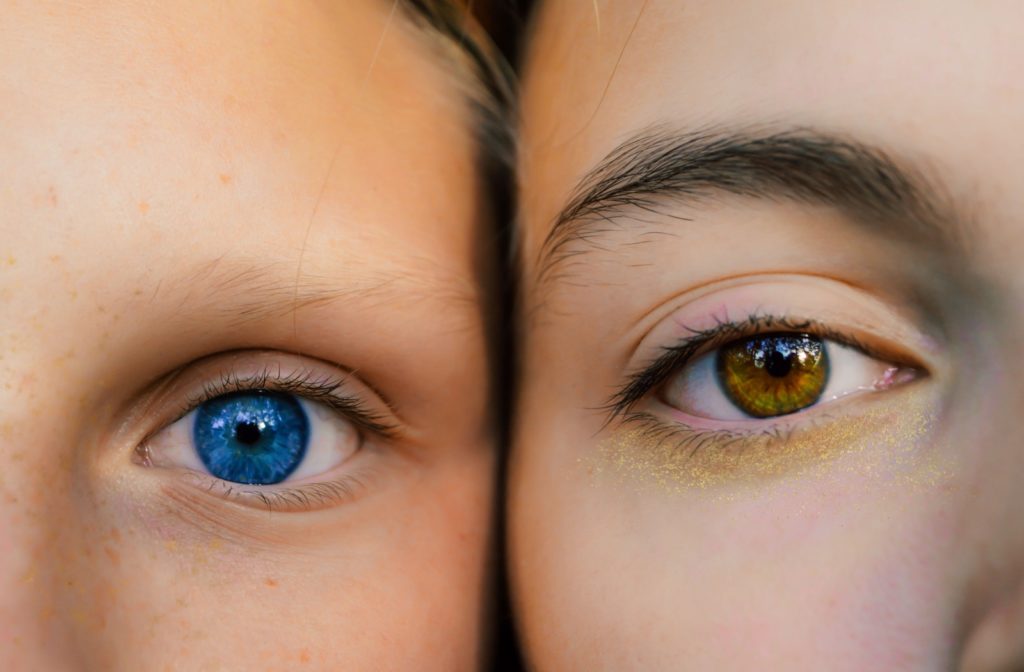It is commonly believed that the pigment in your eyes can stop developing, and their color will stay that way for the rest of your life. However, many people have noticed changes in their eye color over time, with some even reporting that their eyes have become lighter in color.
If you’ve noticed your eyes getting lighter in color over time, here are five possible reasons why:
- Genetics
- Age
- Eye Conditions & Diseases
- Health Conditions & Medications
- Lifestyle factors
Any significant changes in the appearance of your eyes or your vision are not normal and should be discussed with your optometrist as soon as possible.
What Determines Eye Color?
Your eye color is determined by a combination of your genetics and the influence of a pigment called melanin. The iris, the colored part of your eye, gets its shade based on how much melanin is present.
Higher levels of melanin result in darker eye colors, like brown. On the other hand, lower levels of melanin results in lighter colors, like blue and green.
Why Are My Eyes Changing in Color?
The color of your eye can seem different depending on various factors, including:
- Your environment
- The lighting
- Your clothes
- Makeup
You may also notice color changes when your pupils dilate. However, none of these factors actually change the natural color of your eyes.
Changes in eye color are uncommon but possible, occurring in a small percentage of people due to factors like genetics, environmental influences, or medical conditions.
Research shows that 3.8% to 8.6% of people may experience noticeable changes in eye color, either darker or lighter, over several years. A few different factors can contribute to this change.
Genetics
Eye color is determined by multiple genes inherited from your parents and ancestors, with complex interactions involving genes like OCA2 and HERC2.
Eye color can sometimes change during early childhood, but it typically stabilizes by adulthood. Significant changes later in life are rare and are unlikely to be caused by genetic factors. Genetic mutations may impact pigmentation at birth but do not usually cause gradual changes over time.
Age
Color changes often involve changes in melanin, but changes are normally minor. Injuries or diseases can also influence the color of your eyes over time.
While gradual shifts are typically harmless, significant or sudden changes should be evaluated by an eye care professional to rule out underlying health issues.
Eye Conditions & Diseases
Cataracts, often associated with aging, can result in lighter-looking pupils due to the clouding of the lenses. However, cataracts do not affect the color of your iris. Cataracts may cause blurred vision, but they can be treated.
Corneal diseases and eye infections can also affect the color of your eyes. These can be accompanied by symptoms, such as:
- Blurred vision
- Worsening vision
- Eye pain
- Discharge or pus
- Redness and swelling
- Itching
Eye conditions and diseases often require immediate attention. Routine eye exams can help catch and manage problems early.
Other Health Conditions & Medications
Some medications can cause changes in eye color as a side effect, though these changes are relatively rare. For example, prostaglandin analogues, commonly used to manage glaucoma, may cause brown eyes to develop a darker or slightly greenish tint by stimulating melanin production in certain areas of the iris.
Always discuss potential side effects of medications with your doctor, especially if the changes appear permanent or impact vision.
It’s important to note that eye color changes can also occur due to specific eye conditions, such as Fuchs’ heterochromic iridocyclitis, which can cause one eye to lighten or develop patches.
Sudden or significant changes in eye color, particularly if accompanied by other symptoms, should be evaluated by an eye care professional to check for underlying conditions.
Lifestyle Factors
Certain lifestyle factors, like prolonged exposure to UV radiation or the use of colored contact lenses, can influence the appearance of your eyes, though not necessarily their natural color. Your eyes may simply appear to have a different color.
UV exposure harms eye health, increasing your risk of developing conditions that can affect the appearance of your eye, such as:
- Photokeratitis
- Cataracts
- Macular degeneration
Some studies also suggest that UV radiation might increase the risk of developing iris melanoma, especially in people with lighter-colored eyes.
Good eye care practices, such as wearing UV-protective sunglasses and avoiding harmful chemicals, are crucial for maintaining overall eye health and function, even if they don’t affect your natural eye color.
Other Rare Causes
In rare cases, eye color changes can occur due to underlying medical conditions, such as Horner’s syndrome or Waardenburg syndrome.
Horner’s syndrome is typically caused by damage to the nerves that connect the brain to the eye and face, often leading to a lighter-colored iris in the affected eye.
Waardenburg syndrome, on the other hand, is a genetic disorder that can result in a lack of melanin production in the iris, causing striking features like heterochromia (two different colored eyes) or pale, unusually light eye colors.

Should I Be Concerned About Changes in My Eye Color?
In most cases, changes in eye color are harmless and do not require medical attention. Eye color can sometimes appear different, but your eyes aren’t actually changing color.
However, sudden or drastic changes in eye color can indicate an underlying condition, such as inflammation, injury, or rare genetic disorders, that may need medical attention.
For instance, conditions like heterochromia or pigment dispersion syndrome can alter eye color and may require monitoring or treatment.
It is always best to consult with an eye doctor if you notice significant or unexpected changes in your eye color. They can assess the cause and provide appropriate care or reassurance.
Addressing Eye Concerns: Book Your Appointment Today with Total Vision
If you experience any sudden or significant changes in your eye color, it’s important to seek proper evaluation and treatment.
Total Vision Sports Arena prioritizes your eye health and overall well-being. Our experienced team is available for comprehensive eye exams and consultations to address any concerns or changes in your eye color. Schedule an appointment with us today and stay on top of your eye health.



